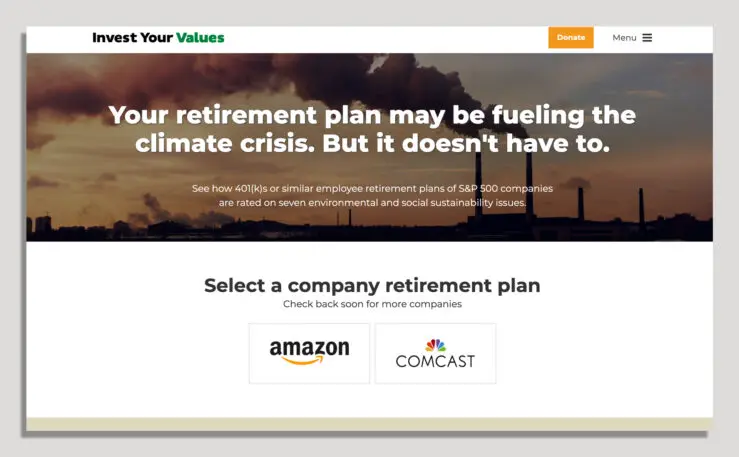In 2019, 3,500 Amazon employees signed an open letter to then-CEO Jeff Bezos, urging him to adopt an effective climate change plan. A few months later, the billionaire CEO revealed a set of sustainability goals, most crucially promising net-zero carbon emissions by 2040. But, in the same year, many of those Amazon employees may not have been aware that the money they were putting away for retirement in their employee 401(k) plan plans was being invested in the very companies that are contributing most heavily to climate change.
That revelation comes up in a deep dive into the 401(k) plans offered by the e-commerce giant conducted by As You Sow, a nonprofit that promotes corporate social responsibility through shareholder advocacy. The organization has a suite of online tools, called Invest Your Values, to make it easier for employees with complicated retirement plans to learn about how their funds work, and to ensure the money they’re earning and investing is going to causes they care about—or, at least, not going to destructive ones such as fossil fuels, arms manufacturers, and private prisons.
Its latest tool evaluates specific companies’ 401(k) offerings. “There’s $10 trillion of assets, owned by 100 million people, that need to be looked at,” says Andy Behar, As You Sow’s CEO. The plan is to perform the analysis for every S&P 500 company, but it’s started with Amazon, evaluating information from its filings for the year 2019. (The company’s funds were handled by Vanguard that year, though it has since moved to Fidelity, but the investment options stayed the same.)

In the next week, As You Sow will be launching a series of social media ads to Amazon employees, focusing on climate and the destruction of the rainforests, to urge them to learn more about where their money is going, and to take action. “We’re going to say: do you know that you own this, and is this what you want?” Behar says. He’ll also send a letter directly to CEO Andy Jassy, to request to meet him and walk him through the scorecard.
Those employees who are uncomfortable with the situation could “self-direct” their funds, says Andrew Montes, As You Sow’s director of digital strategies, meaning they’d handle the exact stocks they’re investing in, but that’s labor-intensive. “We think it’s the plan’s responsibility to be offering sustainable investments directly,” he says. If a sustainable fund doesn’t exist (and he notes Amazon only had one plan passable as sustainable, only carrying about 1.8% of employees’ money), Behar suggests that employees should join with other colleagues, form a coalition, and speak to financial administrators directly, to put pressure on them to create a default fund that is sustainable.
The organization has also released an evaluation of Comcast’s funds, and will next seek to educate its employees about where their money is going (Behar says much of it is invested in the prison industrial complex). What employees should also know is that, morality aside, it’s also a savvy financial decision to invest in environmentally and socially friendly stocks, many of which now provide a great return on investment—while “vice stocks” contain several risk factors. The environmental, social, and governance (ESG) movement is growing, Behar says, and people are finally coming round to the idea that: “We want to put our money into companies that are actually leading,” he says, “and we don’t want to put our money into the laggards.”
Recognize your brand’s excellence by applying to this year’s Brands That Matter Awards before the early-rate deadline, May 3.
